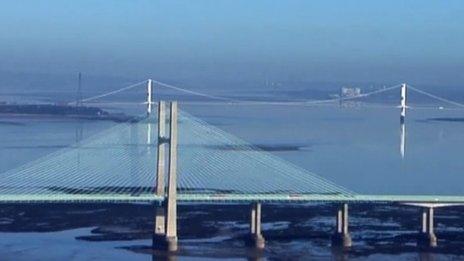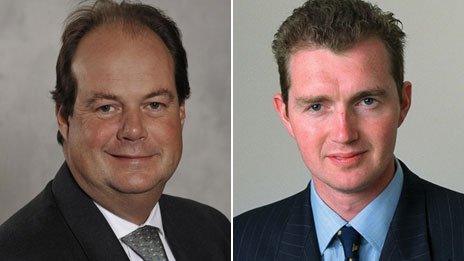Severn tolls - is this the beginning of the end?
- Published
- comments

In 2018 the bridges will come under the control of the UK Government
It has been hotly debated for years but the question about what to do with the Severn bridge tolls is no longer becoming academic.
The reason is that a decision will be made in the next Parliament.
The contract with the company that built the second Severn crossing will come to an end when it has recouped a set figure of just over £1bn.
That depends on how many vehicles pay the tolls. The latest estimate is the money will be recouped by 2018.
If you think that will mark the end of the £6.40 for cars, £12.80 for small vehicles and £19.80 for HGVs then think again.
Not soaked up
In 2018 the bridges will come under the control of the UK Government.
But the tolls will continue for at least another two years because the UK Government then has to recoup around £80m worth of repair costs to the old Severn bridge. This was all part of the original contract.
The UK Government says if those costs are not soaked up by motorists then it would have taken even longer for the cost of the bridges to be paid off.
The big question is what happens after 2020 when the real bill is finally paid off?
Officially the UK Government only has to cover operating costs, maintenance and any future provision for an upgrade.
MPs on the Welsh affairs committee have done plenty of work on this and say those costs make up around a quarter of the overall revenue.
If that is reflected on the tolls for cars, regular users could see it come down from the current £6.40 to between £1.50 and £2.

Tolls not for revenue raising: Stephen Hammond and David Davies
When the then transport minister Stephen Hammond appeared in front of the Welsh MPs last summer he said the law stipulated that the Treasury could not charge for anything other than general costs to run and maintain the bridges.
This was the key exchange between Stephen Hammond and the chair of the committee, the Conservative MP for Monmouthshire David Davies:
David Davies: In the long term, do you think that the toll ought to be levied at a rate that covers the cost of maintenance, and perhaps even a sinking fund for a future bridge, or do you think that the toll represents a good way for the Government to raise extra money for the Treasury?
Stephen Hammond: It clearly is not a good way, nor was it ever intended to be. If you look at what the Act sets out, the toll has to be set at a level that covers operating costs, maintenance and future provisions for upgrade. That is what that level of toll does. It is to be hoped that, if those costs decline over a period, then the tolls will.
David Davies: As a principle, it would be wrong for the Government to use it to raise extra money for the Treasury.
Stephen Hammond: The Government have not used it to raise money.
David Davies: No, but it would be in future.
Stephen Hammond: The Government would not be allowed to do that, Mr Davies. It is explicitly set out in the Act.
Cash cow
So there it is, confirmation that the UK Government would not use the Severn tolls as an £80m a year cash cow for Whitehall coffers, although it should be said during the same hearing he said numerous times that no final decision had been made yet.
And this week's manifesto pledge by the Lib Dems to cut the tolls entirely brings a new dynamic. It's the first of the parties out of the blocks. It will be interesting to see if any others follow in the run up to the general election and whether they feel under pressure to do so.
If they do, then none of this will be helpful to the First Minister Carwyn Jones who wants control of the Severn tolls. He says he'd like to reduce the tolls but crucially he wants to maintain a revenue stream to pay for other infrastructure projects.
Bearing in mind that the Welsh government would still have to pay for maintenance costs if they were handed control then it wouldn't leave any huge room for manoeuvre in cutting the tolls.
And that wouldn't be an easy political message to sell to drivers because it could be that the effect of devolving control of the bridges would mean higher tolls for motorists than if they had remained under the control of Westminster.